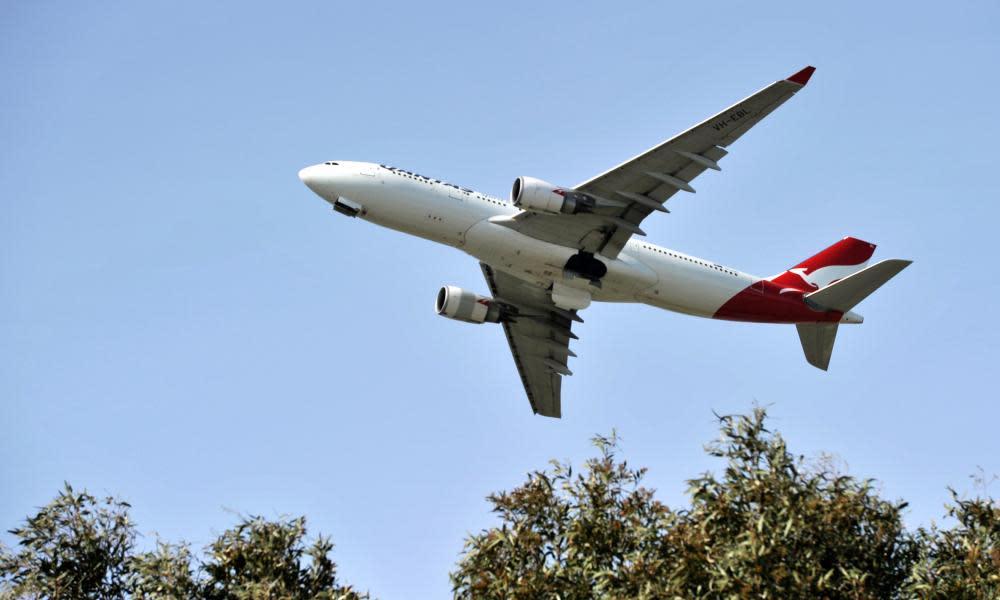National cabinet meeting to discuss Darwin quarantine postponed due to 'problem' with PM's plane

A national cabinet meeting due to discuss a plan to bring back thousands of additional Australians stranded overseas has been postponed, after the prime minister himself became stranded in Queensland with “technical problems” grounding his RAAF plane.
Scott Morrison, speaking in Cairns on Thursday, confirmed that more citizens stuck overseas due to Covid flight caps would soon be able to return home with increased repatriation flights and use of the Howard Springs quarantine facility near Darwin.
But the prime minister was later forced to postpone Friday’s national cabinet, which was scheduled to discuss the plan, due to a technical issue with his plane.
A spokesperson for Morrison said the meeting had been pushed back to next week “because of some technical problems that have prevented the PM’s return to Sydney”. The issue prevented Morrison from leaving Queensland where he has been campaigning this week.
The ABC on Thursday reported the quarantine plan will allow about 1,000 more Australians to return each month – based on a fortnightly rotation of 500 people - with a mix of commercial and charter flights to fly direct to the RAAF base in Darwin.
Campaigning ahead of the state election on 31 October, Morrison confirmed the ABC report, saying he expected more Australians would be able to return home within weeks.
Related: Etihad to stop flights to Queensland as Frydenberg says international border closed until late 2021
Asked about the use of Howard Springs to boost quarantine capacity, Morrison said: “There have been extensive preparations undertaken … on that matter and we’re in the final stages of concluding those arrangements.”
The Howard Springs quarantine facility, 25km south of Darwin, was a disused workers’ village with capacity for 3,500 residents. It was used in February for repatriation flights from Wuhan.
The facility has also been used to house people quarantining from interstate hotspots, although it is not yet at capacity, hosting an estimated 1,000 residents at a time in September.
National cabinet last month lifted the cap on international arrivals and returning Australians from 4,000 to 6,000 but the backlog of Australians wanting to come home has grown to 29,100.
Morrison said the government had “been working now for some months as we’ve been getting more and more Australians home, particularly those in vulnerable situations”. About a quarter of the Australians overseas identified as vulnerable had already returned home, he said.
The Liberal leader said he was “disappointed at one level” because the federal government had been keen for “extra slots” within the quarantine cap to be taken up by the Queensland government, with “empty hotel rooms” in Cairns to play a role.
Morrison said he respected the Queensland government’s decision but using Cairns could have supported hoteliers and accommodation providers there.
“There was one big ‘no’ for Cairns when it came to how the quarantine would be done,” he said. “It was all going to be contained down there in south-east Queensland, down there in Brisbane, and there’s capacity here.”
Related: Dfat admits email addresses of almost 3,000 Australians stranded overseas released in breach
In September, Labor leader Anthony Albanese called for RAAF VIP aircraft – including planes reserved for the prime minister and governor general – to be used to fly home tens of thousands of Australians stranded overseas.
State and territory leaders also pressed the federal government to set up commonwealth quarantine facilities to help repatriate the Australians stuck overseas due to tight caps on international arrivals.
From Friday, New Zealanders will be able to travel to New South Wales, the ACT and Northern Territory without spending two weeks in quarantine, an arrangement expected to be reciprocated after the New Zealand election on Saturday.
Morrison said there would be no New Zealanders travelling in Queensland because the Labor government “insists on a two-week quarantine” which had also prevented New South Wales and Victorian residents travelling to the state.

 Yahoo News
Yahoo News 
